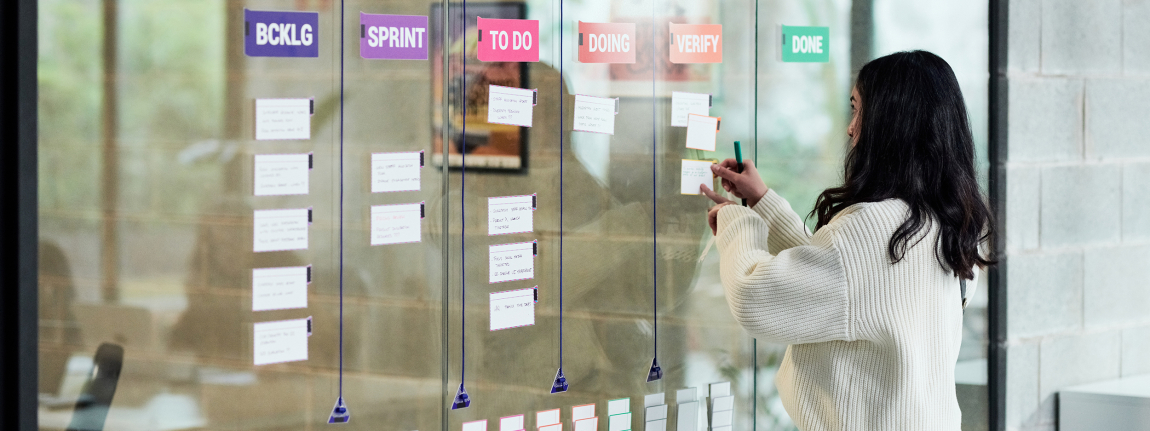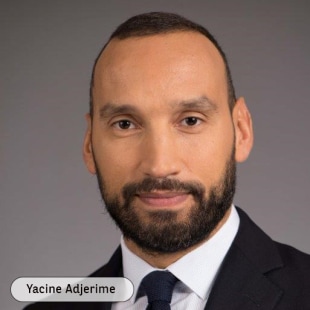Can you tell us about your role?
Yacine Adjerime (Y.A.): I lead the Agile@Scale programme, to which the Agile Skills Centre of French Retail Banking (FRB) is attached, bringing together all our Agile Coaches. My team and I have the mission to build and test our Agile@scale operational model and to support the various FRB business lines in the adoption of these new working methods. Our ambition? To become collectively more efficient in the design, development and distribution of our solutions for our clients. All our activities are affected, not just our IT colleagues! Agile values should permeate our entire organisation and are now being promoted at the highest level, supported by the FRB Executive Committee. We're convinced that Agile cannot work in the long term without a mindset that is both client and team oriented.
How does working in Agile mode happen at FRB?
Y.A.: The strength of the Agile methodology lies in the “squads”. These are multidisciplinary teams of around ten people, who bring together all the skills and expertise we need not only to design and improve the client or employee journey, but also to develop solutions of all kinds - and not just IT, contrary to what one might think. These teams are autonomous and empowered around common objectives, in order to respond faster and more closely to our clients' needs.
They deliver progressively, by iteration, and this is very beneficial! So, we don't have to wait months to start delivering value to our clients... We can quickly adjust our focus if we find that our solution doesn't meet the needs that they've expressed. As you will have understood, the important word, beyond the organisation, is the client. Agile is not an end in itself. It's a powerful way to be where our clients - and employees, who are “internal clients” - expect us to be. This test & learn approach is central to our new product development process. It also means accepting the right to make mistakes.
This is a cultural evolution that we also support. In the end, we like to sum up our Agile approach at BNP Paribas in three words, as simple as a jingle: faster, better, happier. Faster because we're in a position to accelerate the time to market. Better, because we use customer and employee feedback (suggestions, recommendations and also complaints) to continuously improve our products. Happier, because we invest a lot in these new skills and this new work culture for our teams, our employees, who gain in terms of autonomy... and employability. It is our role as a responsible employer to support all our employees in FRB's business lines and functions in these new ways of working together, which are becoming standard in our industry.
When you introduced yourself, you mentioned the “scaling up” of the Agile method. What does that mean?
Y.A.: At BNP Paribas, the Agile method is a reality. This is a major move that our Belgian colleagues at BNP Paribas Fortis, and also our Italian colleagues at BNL, have already undertaken. For our part, within FRB, we started this movement progressively, capitalising on experiments in “platform” mode conducted on key client paths such as the onboarding or home loans. For almost two years now, we have been moving up a gear to deploy this approach more globally. But the movement goes much further: the Group's General Management has decided to deploy Agility across all Group entities, as part of a vast transformation plan that it has just launched - that's why we speak of “Agile at scale”. We interact a lot, in a spirit of solidarity, to support each other in this major change of scaling up, from top management to operational teams. Our goal is that by the end of 2022, the whole “panorama” of our client and product journeys will be covered by Agile operating modes. Agile Coaches are there to help us in the long run, because it is a profound transformation.
What is the added value that the Agile Coach can bring to a large banking group?
Y.A.: The world of banking and finance is changing fast: the increased digitisation of customer journeys and the development of self-care are entailing very significant changes, while respecting a demanding regulatory and compliance environment.
If we are to continue to be a financial group recommended by our clients, we must constantly innovate to enrich our solutions. Agile also carries this innovation challenge. And it's also part of the Agile Coach's mission to encourage this open-mindedness towards other solutions and tools. The job of Agile Coach has a very bright future at FRB and within the other business lines of BNP Paribas.
« We must constantly innovate to enrich our solutions. »
What qualities do you expect from future Agile Coaches?
Y.A.: An Agile Coach must first and foremost place the customer at the heart of all our creation and continuous improvement processes. If the teams move away from this path and the Agile mindset, it will be his or her role to guide them towards this customer-orientation approach. The Agile Coach will accompany teams who are learning the Agile approach: we will expect him or her to be involved and demanding so that we can collectively achieve our goal of being more agile. Agile Coaches must also be responsive and know how to adapt to the different populations they coach. Another skill we're looking for is discipline, in order to be able to rigorously apply the Agile methods we use: scrum, design thinking, lean start-up, kanban, etc. Finally, he or she also needs determination and open-mindedness to help apprehend novelty and change, to develop ever more innovative offers, possibly in partnership with external actors. In short, an Agile Coach has a great deal of responsibility: to make us "grow" in order to aim for excellence for our clients... and fellow employees!
How does one become an "Agile Coach"?
Y.A.: The Group is continually investing in the evolution and enrichment of training courses on the Agile approach. For example, at FRB, we've launched an extensive training programme on the new Agile roles (product owner, scrum master, etc.). We've also developed a specific pathway to support internal employees to take up Agile Coach positions. Our ambition is to have 50 Agile Coaches by 2023. This group will include employees that we've coached and trained as well as external candidates who want to join the Agile adventure of BNP Paribas.
Any advice for professionals interested in Agile coaching?
Y.A.: We're undertaking a major transformation, in line with our strategic priorities, in a leading financial group. This movement is inexorable and will lead us to be faster, closer to the needs and expectations of our customers, and even more innovative. To achieve this, our organisation is breaking down barriers, with employees who have understood the challenge - for them and for the company - of pushing boundaries. In my opinion, becoming an Agile Coach at BNP Paribas means embarking on an adventure that is rich in meaning, exciting and value-creating.
Want to know more about FRB's Agile Transformation program?
Find out what David Elkaïm, Agile Coach, and Pierre Ruhlmann, Chief Operating Officer and Chief Transformation Officer of FRB have to say in video.



